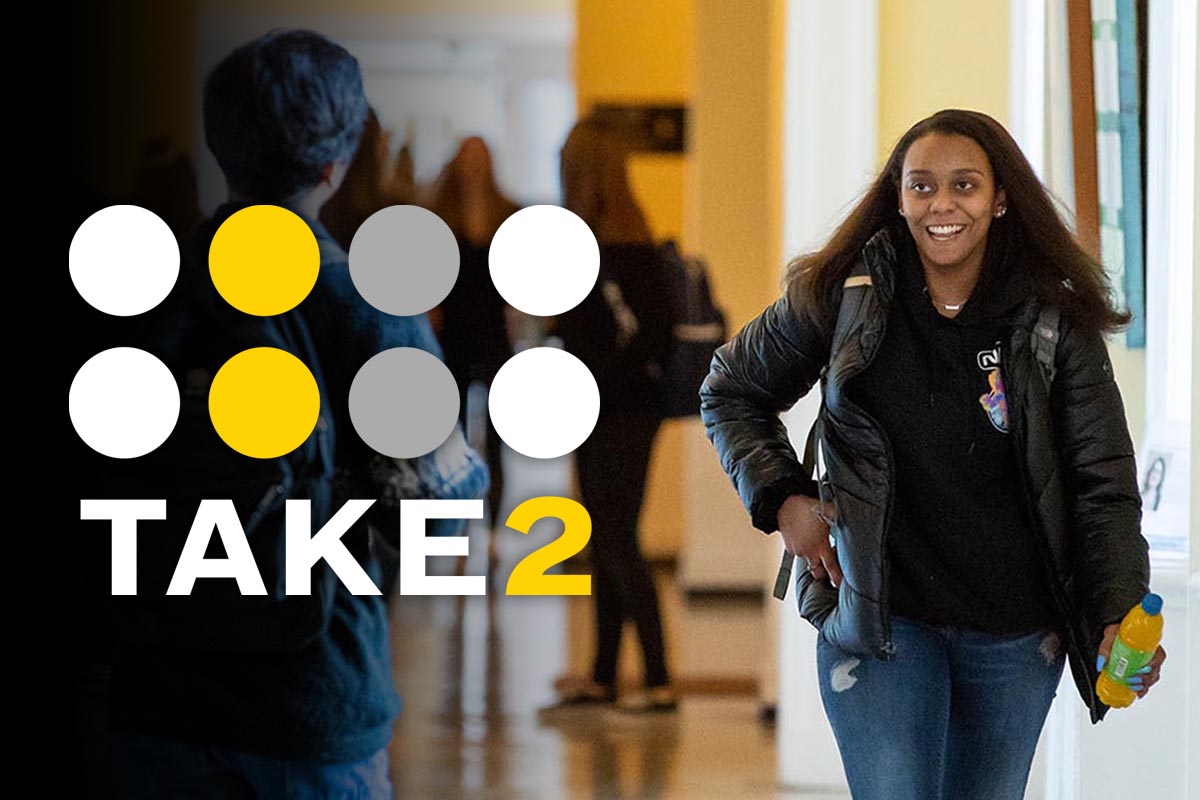Randolph's M.F.A. in Creative Writing program celebrates first graduates
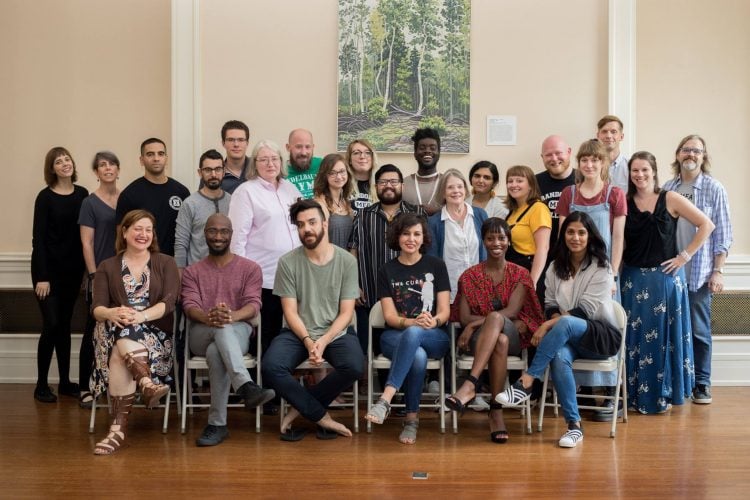
Core faculty and students in Randolph’s first M.F.A. in Creative Writing residency program.
For Lucille Hayes ’20 M.F.A., there’s a certain magic every time she returns to Randolph College’s campus.
Hayes, currently based in Brooklyn, is part of the first graduating cohort for Randolph’s M.F.A. in creative writing. The low-residency program features five 10-day residencies and one-on-one mentorship with some of the most talented writers working today.
“Each residency is a portal into imagining what is possible for the writing life—believing in each other and being believed in, learning dozens of new concepts every day, and engaging with this work that can often feel so solitary amongst a brilliant community,” Hayes said. “It’s magic, truly.”
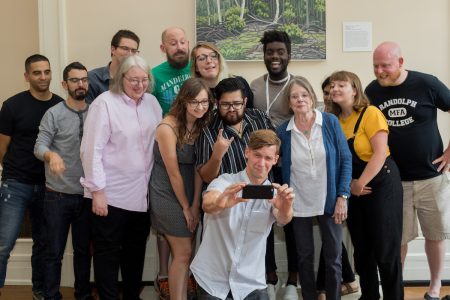
Students in the first M.F.A. residency pose for a selfie in 2018.
The latest residency—the last for Hayes and 11 of her fellow students, who will be recognized during a virtual graduation ceremony tonight—began last week.
“It’s gone so quickly. Too quickly,” Hayes, a poet, said. “It feels strange and sad, and in this moment, I feel a bit panicked. Like, wait, no, I’m not done with this place yet! But it’s an honor to graduate alongside the writers that I’ve gone through all of this with and I’m grateful to do this with them.”
Because of COVID-19, the residency moved online, with a series of virtual rooms set up evoking places on campus—The Jack Lounge, Leggett Hall, the Dell Room, Wimberly.
The days have been filled with lectures, readings, workshops, writing exercises, and even some bonding opportunities—happy hours, trivia nights, open lunch rooms, and an attempt at karaoke, which has become an M.F.A. tradition.
“Our residencies are the core experience we share as an M.F.A. community,” said Gary Dop, English professor and program director. “They serve as the opening of each new semester, a way of building a communal and intellectual foundation. In our transition to a virtual residency, it was vital that we were honest about the ways in which our students might experience loss—and out of that honesty, we could consider what we can do to add value in other ways.”
Dop said the online residency gave them increased access to guest writers, agents, and editors, while also increasing the amount of one-on-one time between students and faculty members.
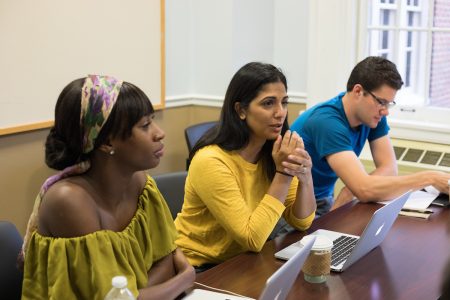
M.F.A. faculty members Wayétu Moore (left) and Mira Jacob (middle) lead a workshop during the first M.F.A. residency program at Randolph in 2018.
“We have more than doubled the usual number of guest writers we bring in to our community,” he said, “and some of the choices we’ve made in how we use our time together will continue to influence us even when we return together.”
In addition to sharing their work through readings, the graduates have been defending their thesis manuscripts, book-length works of fiction, nonfiction, or poetry, in front of their thesis committee. They’ve also had the opportunity to have one-on-one meetings with editors and agents.
“There’s at least one lecture and conversation each semester about publishing, agents, and marketing,” said Mateo Lara ’20 M.F.A. “But since this is a graduating semester for us, there’s a more heavy influence on what we’re going to do next and showing us our options for finding an agent and getting published. Giving us the tools to do that. Some of us do want to pursue a book. I want to pursue a book. I want to put my work out there for my community, for myself.”
Lara, a poet based in Bakersfield, California, said being part of the first graduating cohort is something special.
He discovered the program through a mentor from his undergrad years and said he couldn’t believe it when he saw the faculty, which has continued to grow with the addition of more award-winning, acclaimed authors since the program’s launch in 2018.
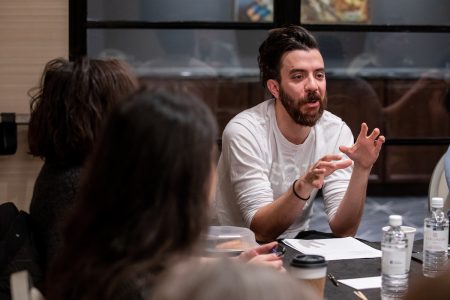
M.F.A. faculty member Kaveh Akbar leads a workshop for poetry students during their winter residency.
“I thought, ‘If I get in, I can be taught by these people I’ve been reading,’” Lara said. “I submitted my application and played the waiting game. I got into a couple of other programs but I wanted to go to Randolph because of the mentors. It’s a really well-rounded group of people.”
The first residency, in the summer of 2018, featured a keynote address by Pulitzer Prize-winning poet Gregory Pardlo, who also met with students, and presentations by faculty members like Kaveh Akbar, Wayétu Moore, and Mira Jacob.
Hayes also felt an immediate connection to Randolph.
“I knew I wanted a low-residency program, and when I spoke to people from other programs, they were compelling but lacked the electricity and intentionality of the conversations I had with Randolph faculty and staff,” she said. “It was a risk to join something new, but it felt like I was joining the right people to take a risk with.”
After each residency, students are paired with a new faculty member, who they work with for 20 weeks, sharing new writing and revising works in progress.
“I appreciate that we get to learn from people who model for us in real time how to be responsible literary citizens and make a life as a writer,” said Hayes, who has pursued her M.F.A. while working full-time.
“It’s also been a good reality check: My heroes are just people. They’re incredible and diligent and talented, but they don’t have any special secrets or magic spells cast upon them—I don’t think—and so I’ve also found that they are all very humble and transparent about how they’ve gotten where they are, which makes them all the more delightful to learn from.”

M.F.A. student Mateo Lara reads selections from his work during the Randolph College M.F.A. winter residency.
Lara said his work has grown exponentially over the past two years, to become deeper and more honest than it was previously.
“I feel like I’m not afraid to talk about what I need to talk about,” he said. “I was always dancing around subjects and using abstractions and language to hide what I wanted to say. There’s depth now that I didn’t have and a power I didn’t have, and I’m grateful for that. I wouldn’t have the fire I have now if I didn’t have them to lead me.”
Beyond the connections with faculty, Lara has also formed lasting bonds with his fellow students.
“We keep in touch outside of the program. There are definitely still those bonds and those talks and those threads. It’s nice to know that people I interact with through the cohort are very supportive of growth and change. That’s a community, even if we’re not right by each other. It’s definitely going to stay something permanent in my life.”
Tags: 2020 graduates, creative writing, master of fine arts in creative writing, MFA, MFA residency